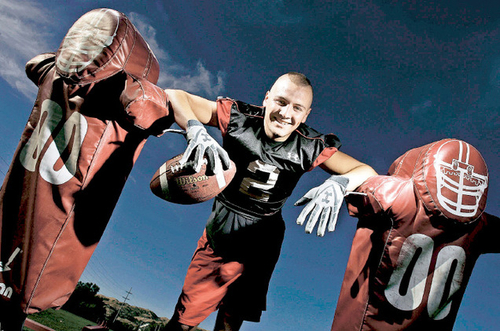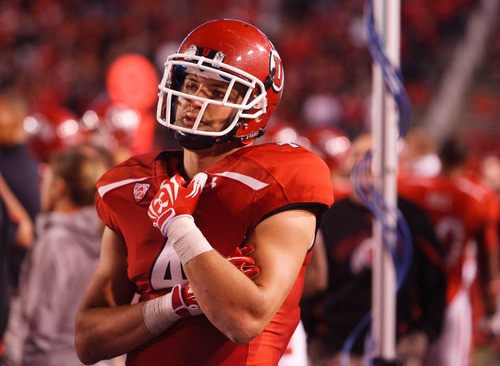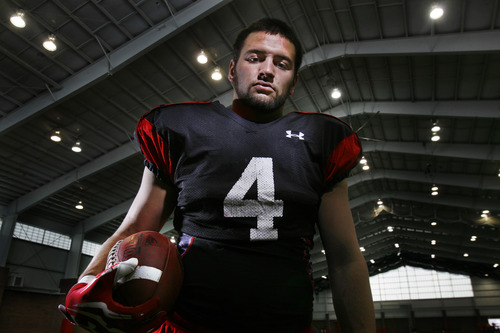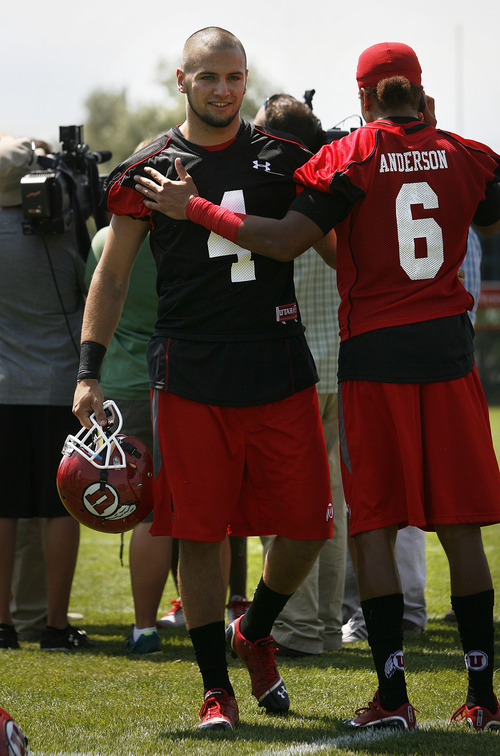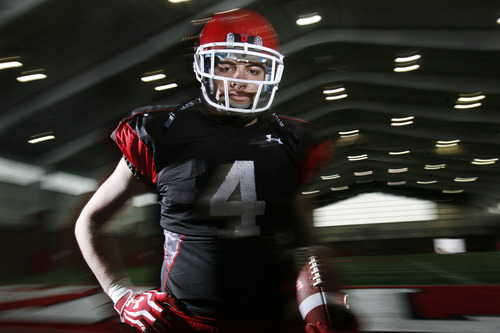This is an archived article that was published on sltrib.com in 2013, and information in the article may be outdated. It is provided only for personal research purposes and may not be reprinted.
Brian Blechen remembers with exactness being called in by Utah football coach Kyle Whittingham and told before the start of last season that he'd been suspended, that he would miss the first three games. He realized in that moment and in a lot of moments yet to come that he screwed up in a big way.
He had smoked marijuana and failed a couple of drug tests.
The star safety, who was named honorable mention All-Pac-12 as a sophomore in the Utes' first year in the league and had become from the beginning of his freshman season a main beam on which the Utah defense was hung, suddenly was relegated to scout team duties during practices. On subsequent game days, he might as well have picked up two pompoms because, competitively speaking, he was of no real use to his teammates.
"I knew I'd be missed in those three games," he says. "It gave me a lot of time to think about how I hurt the team. I was remorseful, but, right away, I wanted to make up for that lost time. Each season goes so fast. You learn how precious every game is. That helped me grow up a lot. Every game, I suited up, but I knew I wasn't getting in. I just tried to help out. I was sad. Actually, I was real pissed off. But I didn't have anyone to be mad at but myself."
Blechen has never spoken directly in any detail about the indiscretions, at least not publicly. He says coaches didn't want him to talk about specifics, but sources close to the situation say he failed the drug tests and those failures then required his suspension by the school. He quite cryptically says there was one other team violation, as well.
"It was about team rules that were in place and a school policy," he says. "The suspension had to happen."
Whether detailed admission is required for the bestowal and achievement of authentic redemption is for outsiders to decide. Blechen says he's handled his problems, sat out his suspension, absorbed genuine lessons and grown as a man.
"I learned respect for the rules," he says. "I learned about being smarter when it comes to making the right decisions. A couple of bad decisions can hurt you and the entire team. I've learned to help out younger guys, to be a good leader, if I see them doing something wrong. I've been on the wrong side of the rules. That's not where they want to be.
"I'm glad it's over. It's definitely made me stronger as a player and a person. It changed me. It made me realize some things aren't worth it. I learned you can do a lot of good things, and if you do a few bad things, it counts for a lot more than the good."
What galls Blechen as much as the effects of his own mistakes on him is that those personal blips were a greater reflection of Utah's season on the whole, a year during which the Utes lost four straight games at one point, went 5-7 overall, 3-6 in the Pac-12, and failed to qualify for a bowl game.
"It seemed like the whole season, we'd make good plays, but a small handful of plays would blow it for us," he says. "That happened in five or six games. It was a bummer."
Not what Blechen had in mind when he came to Utah in 2010 from Moorpark (Calif.) High School. As a multi-sport athlete — he played at varying stages soccer, baseball, basketball, ran track and swam — Blechen had drawn interest in football from Colorado, Boise State and Nevada, mostly as a quarterback, but also as a defender, having also played linebacker and safety. The first time he became aware of the Utes' program was when Utah won the 2009 Sugar Bowl.
After he got to campus, coaches who had studied film of Blechen, asked how he felt about going to the defensive side. His response: "I just want to get on the field."
He did — with panache, intercepting a pass in overtime against Pitt in his initial game, which set up Utah's game-winning field goal. Over his first two seasons, playing strong safety and 'backer, he repeatedly made big plays, including seven picks, two of them game-savers.
Just halfway through his time at Utah, Blechen already had become one of the team's highest-profile players. Laid-back and mellow off the field, and wildly intense on it, he crossed a quick threshold as one of the program's true centerpieces.
Then came the suspension — and greater scrutiny.
"I let the team down," he says. It kicked him in the head and messed up his team's mojo. Even after his return, nothing fully clicked. And then, the season went dead.
Now, Blechen is looking forward to a climb steeper than once presumed by almost everyone at Utah — winning more than losing in the Pac-12.
"There are no easy games anymore," he says. "In the Mountain West, there were games you should win. Now, every game is a challenge. I like that."
The Utes, who are in the middle of spring practices, say they are adopting a humble attitude, going about their business, putting in their work, intending the way every sub-.500 team does to keep new promises, to earn new success.
"A lot of the team has a stronger mindset," says Blechen, who leads the Utes in those lessons learned. "Right now, our team is working so hard. We know what it's going to take to succeed in the Pac-12. We learned so much from last year. We're working harder, being smarter, doing whatever it takes. We're treating last year as a learning experience. I can't wait for this season to start."
GORDON MONSON hosts "The Big Show" with Spence Checketts weekdays from 3-7 p.m. on 97.5 FM, 1280 and 960 AM The Zone. Twitter: @GordonMonson. —
Brian Blechen file
• Senior safety, 6-foot-2, 212 pounds
• From Moorpark, Calif.
• Has been starter at safety since freshman year
• Freshman All-American
• All-Pac-12 honorable mention as sophomore


